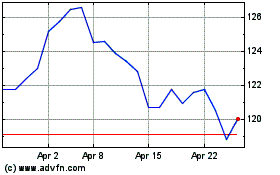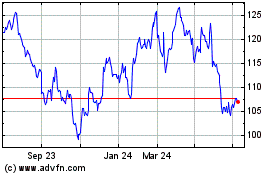VW Has the Profit to Take on Tesla. Does It Have the Talent? -- Heard on the Street
May 06 2021 - 9:32AM
Dow Jones News
By Stephen Wilmot
Volkswagen has to show more than healthy profits on conventional
cars to live up to its current share price.
On Thursday, the German automotive giant reported first-quarter
operating profit of EUR4.8 billion, equivalent to $5.8 billion and
above FactSet consensus expectations of roughly EUR4.3 billion. It
also raised its forecast for its full-year operating margin to
between 5.5% and 7%. The upgrade offers reassurance that VW isn't
being overly affected by the chip shortage, but wasn't hugely
surprising. Analysts already expected a 6.9% operating margin on
average, according to FactSet. The shares barely moved.
VW investors are focused on other things, most notably the
company's electrification strategy. VW has pitched its ID.3 sedan
and ID.4 crossover as the leading competitors to Tesla's Model 3
and Model Y. Amid intense interest in electric vehicles more
generally, the capital markets are giving it credit, notably in the
U.S. VW's ordinary shares are up 54% this year, led by trading in
their American depositary receipts.
Even after a recent correction, the ordinary shares trade at
roughly nine times forward earnings. While that is very cheap
compared with Tesla, it is more than VW's local peers, Mercedes
owner Daimler and BMW, which, like their car brands, have
traditionally fetched a premium. VW's preference shares, an
economically identical security that is more widely traded in
Europe but offers less liquidity in the U.S., are slightly cheaper,
but well above historical valuation levels.
A lot is riding on the rollout of VW's new EVs. They have
garnered largely positive reviews, and VW sold almost 60,000
all-electric vehicles in the first quarter as it ramped up
production. But that was just 2.5% of the company's total sales. It
remains far too early to know if the products will follow the VW
Beetle and VW Golf in opening a new era, as hoped. Tesla sold
almost 183,000 of its Models 3 and Y in the quarter.
The key weakness of the ID.3 and ID.4 appears to be software, an
issue that the company has acknowledged by investing heavily in a
new software company that it wants to take over from external
suppliers in 2025 or 2026. Research-and-development costs totaled a
massive EUR4 billion in the quarter, 7.7% of sales.
Chief Executive Herbert Diess often says getting software right
will be harder than making successful EVs for Volkswagen, which
airs its internal struggles more publicly than most companies due
to its unusual governance structures. Coding requires a different
kind of employee and management culture than vehicle manufacturing.
That is a problem for VW because vehicle software -- and the
recurring service revenue that might eventually be made through it
-- is the only thing likely to justify the higher valuations
investors are now giving car makers as the electric age dawns.
VW is the archetypal old-school car maker raising hopes as it
bets big on EV technology. While the solid profit the company is
still making from conventionally powered vehicles is a prerequisite
for financing that bet, it says little about its chances of paying
off.
Write to Stephen Wilmot at stephen.wilmot@wsj.com
(END) Dow Jones Newswires
May 06, 2021 09:17 ET (13:17 GMT)
Copyright (c) 2021 Dow Jones & Company, Inc.
Volkswagen (TG:VOW3)
Historical Stock Chart
From Mar 2024 to Apr 2024

Volkswagen (TG:VOW3)
Historical Stock Chart
From Apr 2023 to Apr 2024
